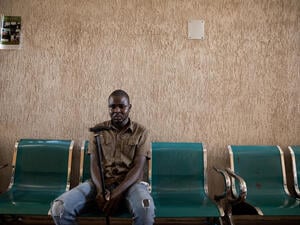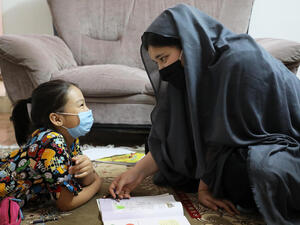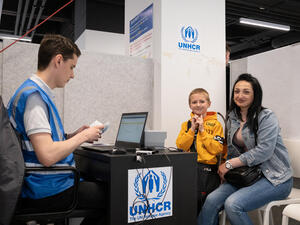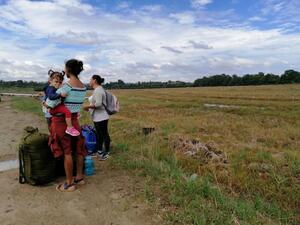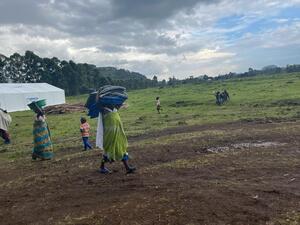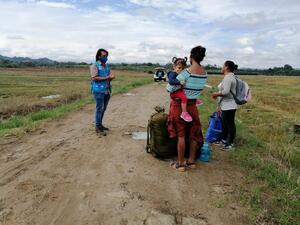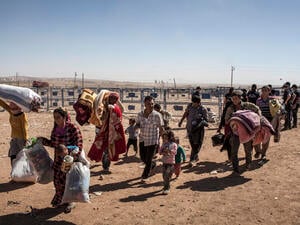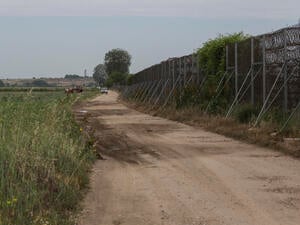UNHCR struggles to find solutions for Afghan asylum seekers in Russia
UNHCR struggles to find solutions for Afghan asylum seekers in Russia

Afghan and Russian children at a World Refugee Day event last year in Moscow. Afghan asylum seekers are finding it hard to get recognition in the Russian federation.
MOSCOW, Russian Federation, April 17 (UNHCR) - Afghans constitute the largest number of asylum seekers in Russia but many, including children of officials who worked for the pro-Soviet government in Kabul during the 1980s, have failed to gain refugee status and need other solutions.
"The approval rate for refugee status is about two percent to five percent and for temporary asylum, some 30 percent. Over 70 percent of all applications are submitted by Afghans," said Vladimir Rucheikov, head of asylum issues in the Citizenship Department of the Federal Migration Service of Russia.
At the end of last year, 962 out of 1,020 people with temporary asylum status were from Afghanistan. Of 405 people in Russia with full refugee status, 240 were Afghans. Thousands have been rejected.
The flow of asylum seekers from Afghanistan has many causes. Some - such as those associated with the pro-Soviet regime in Afghanistan in the 1980s - came to escape a hostile new government. With the rise of the Taliban in the 1990s, the number of Afghan asylum seekers increased. Now the flow largely reflects continuing human rights violations and political instability in their country, Russia's porous borders and its proximity to Western Europe.
The Russian Federation has been a party to the 1951 Refugee Convention and its 1967 Protocol since 1992. The country has an established asylum system but its implementation is fraught with shortcomings. Asylum seekers face long waits on applications; a lack of documents to protect against refoulement (forced repatriation), administrative fines, arrest and detention; and a lack of access to social and economic rights.
Very few Afghans receive refugee status in Russia. From 1997 until the end of last year, 8,671 applicants, including 844 Afghans, were granted refugee status. Of those, 7,777 came from countries in the Commonwealth of Independent States that covers most of the former Soviet Union - mainly refugees from Georgia who subsequently received Russian citizenship.
Many Afghans had entered Russia through Uzbekistan and Tajikistan and were blocked from refugee determination procedures under the "safe third country" rule - they could have found refuge in the first country they entered from Afghanistan.
For those who are UNHCR beneficiaries but have not received refugee status in the Russian Federation, UNHCR has had to seek other durable solutions such as resettlement or voluntary repatriation.
Since UNHCR began voluntary repatriation of Afghans in 2002, more than 4.8 million Afghans have gone home, mostly from Pakistan and Iran. Only 548 Afghans returned home from Russia. There are reasons besides continuing instability in Afghanistan.
Some Afghans who supported the Soviet-backed regime would be in danger if they return. Many Afghans have lost contact with relatives and now lack the necessary social support network. Children were born or educated in the Soviet Union, acquiring western customs and ways of dress - especially a problem for young women. They know little of Afghan culture and traditions.
"It will probably take many years for the situation in Afghanistan to improve to an extent that would allow all Afghans who have been staying in Russia for a decade to return in safety and dignity," said Wolfgang Milzow, UNHCR representative in the Russian Federation.
Golguhay Maikhantarast, a 51-year-old single mother of five children who has lived in Russia since 2001, will not return. "Without legal status, without a job I do not see any future for my children here, but I'll not go back to Afghanistan for the safety of my children," she said. "My only dream is to acquire a legal status and give my children a chance to receive education. It is possible only if we are resettled to another country."
Unable to return to Afghanistan and denied refugee status in Russia, Afghan asylum seekers see resettlement as their only hope. Under a UNHCR programme begun in 2000, more than 2,000 Afghans were resettled - mainly to Canada and the United States - including 533 last year. However, resettlement countries normally do not accept former members of law enforcement bodies. "A humanitarian solution is needed for these Afghans to remain in Russia after all attempts to resettle them have failed," Milzow said.
Afghans who cannot be resettled are desperate. Some have opted to divorce their wives to give their families a chance to be resettled separately. Others have let their adult children be resettled. UNHCR wants Russian authorities to grant such people refugee status or a residence permit.
Nothing better illustrates the predicament than the "Afghan orphans." They are children of high-ranking government officials, military officers or members of other Afghan security forces who were brought to Russia under an agreement between the countries. All speak Russian better than their native language and know more about Russia than Afghanistan. For them resettlement to a third country would amount to another displacement. Nevertheless, very few have been granted refugee status in Russia.
By Vera Soboleva in Moscow, Russian Federation

